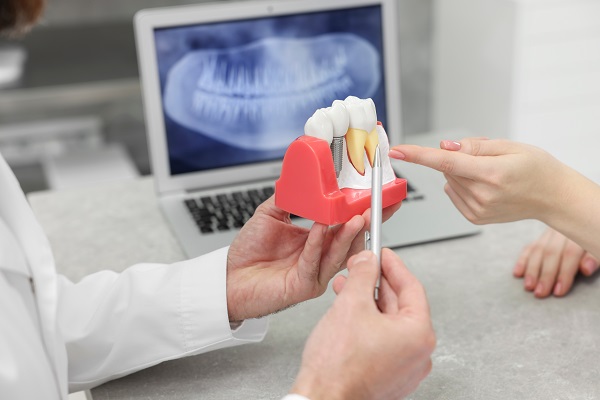Can Dental Implants Support a Dental Bridge?

Looking for information on dental implants? If you have suffered significant tooth loss, but not enough to need a complete arch replacement, you can get a dental bridge supported by dental implants. Implant-supported bridges can provide a reliable, functional, and long-term solution to tooth loss. Unlike traditional bridges or removable partial dentures, a dental implant-supported bridge will not need the support of the surrounding healthy teeth.
How do bridges supported by dental implants work?
In a traditional dental bridge, existing teeth on the sides of the missing tooth are filed down and covered with dental crowns that will support the new false tooth. This means that there had to be healthy teeth on the jaw to hold the bridge. It has been used for decades for replacing a lost tooth. Bridges are usually created from porcelain, so they are customizable to match the remaining teeth.
With implant-supported bridges, dental implants are inserted into the jaw, providing a solid anchor as the bone and the titanium post fuse together. A bridgework of false teeth is fabricated to match the shape, size, and color of the existing teeth. The bridge is then attached to the implant.
After the implants are placed, patients will need to keep up with dental checkups to ensure the bone is healing correctly. The success of the procedure depends on the osseointegration process. Using dental implants to support a dental bridge makes it more stable and functional.
The benefit of implant-supported dental bridges
Implant-supported dental bridges do not require natural teeth. Each end of the bridge is anchored to a single dental implant. They are suitable in cases of multiple missing teeth. They make it possible to replace more teeth than a conventional bridge. As many as three to five teeth can be restored at one time. Implants are incredibly strong and can handle more weight than a regular tooth.
Regular bridges weaken eventually. Decay can occur around the supporting teeth. Bone loss can compromise their fitting. Most traditional bridges need to be replaced every decade or so. In a few decades, patients may end up paying for two or three dental bridges.
The constant repair and refitting of bridges cause the deterioration of the supporting teeth. Eventually, there may not be enough enamel to perform the process. If issues occur with only one tooth, it may be difficult for the other healthy tooth to provide support to the bridge adequately. Therefore, there are more risks with traditional bridges than using implants to support a bridge.
An implant-supported bridge lasts longer than regular bridges. The tooth restoration can last a lifetime with proper care and maintenance. Even if the bridgework deteriorates, the implants underneath will not need to be replaced or refitted. Implants are considered the most durable tooth replacement option available. Once the bone fuses with them, the implants are secure and help to improve bone quality.
Are you considering getting dental implants?
Tooth replacement with a dental bridge supported by dental implants can help to maintain the natural alignment of the teeth. To know whether you are eligible for this option, book an appointment with an experienced dentist. The sooner the replacement is done, the better.
Request an appointment here: https://www.coalcitydental.com or call Coal City Dental at (815) 634-6046 for an appointment in our Coal City office.
Check out what others are saying about our dental services on Yelp: Dental Implants in Coal City, IL.
Related Posts
You can visit the general dentist for diagnosis and treatment if you are experiencing signs of temporomandibular joint disorder (TMJ). Symptoms include jaw clicking, headaches, tenderness, and pain around the jaw area. TMJ pain can be disruptive to normal living, so it is advisable to visit the dentist as soon as possible for help.The joints…
All-on-4® implants are an ever-growing trend due to their permanence and ease. Many people struggle with temporary tooth solutions such as dentures, as they can slide around and need frequent resizing. All-on-4 implants are completed by inserting posts into the jawbone and replacing all teeth. Before attempting to get surgery for the implants, there are…
Many children experience dental anxiety before a dental checkup. However, the good news is that there are certain things parents can do to help children deal with their nerves before a visit with a kid friendly dentist. By taking the time to help your child deal with their anxiety at a young age, it can…
Emergency dentistry for a root canal is sometimes the only way to relieve your pain. Some patients may have a root canal scheduled for a future date, but they find themselves in severe pain at an inconvenient time because of tooth pain. There may even be times when a patient may not realize they need…
